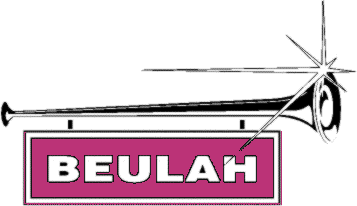|
|
Beulah quoted
"These
are careful transfers which make the most of the material, whereas I
suspect that some others just stick an LP or 78s on the turntable and
give us what comes out the other end. Beulah’s results are comparable
with the fine transfers which Naxos Historical offer. " Brian
Wilson at Music Web International
"The
Beulah
record label has always been one of the most idiosyncratic, and
therefore perhaps most interesting, of reissue marques. While the basic
character of Beulah remains the same as in its Compact Disc days, the
range of its present catalogue, driven now by the ease of downloading,
has been extended in remarkable fashion. Browsing the Beulah catalogue
is now rather like being in a 78rpm record shop: there are plenty of
recordings of short pieces available to whet your appetite for either
repertoire or artist, while at the same time there are numerous full
length works available if you wish to consolidate your collection with,
for instance, major symphonies. All of Beulah's transfers, as might be
expected of a distinguished reissue label, are of very high quality."
David Patmore writing in Classical
Recordings Quarterly
"Beulah
releases are available from other
suppliers but  offer them in
lossless sound" Brian
Wilson at Music Web International offer them in
lossless sound" Brian
Wilson at Music Web International
Reviewer's Recommendations
David McDade's review of Erich Kleiber conducting
Betthoven Symphony No 9
"
One of the great what ifs of conducting concerns what might have
happened if Erich Kleiber had lived on to the ripe old age of a
Klemperer or a Karajan. His post-war recordings give a tantalising
glimpse of a career that would certainly have rivalled those two big
names. This new restoration by Beulah affords us such a perspective on
what might have been and the view it provides is of a very modern
performance indeed.
"Right from the first bars, it is clear that Kleiber’s is a tough,
uncompromising vision of the opening movement...Kleiber is brutal and
unbending in the way he drives the music on. It is very exciting and
the mellowness of the sonorities of the VPO save it from sounding too
severe.
"Having cracked the whip in the first movement, Kleiber can afford to
let things relax a little. Kleiber is very keen to stress that this is
in triple time which he achieves with a fractionally slower tempo.
"In the slow movement movement, whilst on the quick side compared to
Furtwängler, ... Kleiber, with a characteristic minimum of fuss chooses
a sensible adagio molto speed and in doing so gives himself plenty of
room for a nicely flowing alternating andante moderato. Once again, the
VPO are on their best behaviour for Kleiber and play with great beauty
in a way again surprisingly free of mannerisms.
"This makes the Achilles heel of this recording – the choral singing –
all the more unfortunate. Decca have assembled a very starry roster of
solo singers but have got rather lumbered with Karajan’s favourite
choir. The politest thing that can be said about them is that they are
as soft focused as they ever were for das Wunder Karajan. Presumably
aware of the severe limitations of his chorus, Kleiber chooses some
uncharacteristically conservative tempi. I don’t believe for a second
based on the opening two movements alone, that Kleiber would have
chosen such modest speeds if he had access to a better choir. As it is,
it is a serious blot on an otherwise exceptionally fine Choral
Symphony. "
"Beulah have done a sterling job of brightening the sound compared to
the most recent Decca reissue which, particularly in the opening
movement, gives the sound real punch. I’m unsure whether clearer sound
does the Wiener Singverein any favours but the orchestra sound glorious.
" Kleiber’s conception is deeply compelling and few
conductors have got as much out of the Vienna Philharmonic."
Read the
full review.
New for October
Many music lovers miss the sound
from vinyl pressings.
Many others have yet to discover how great the sound can be.
Most of our albums are mastered from vinyl LP pressings and earlier
recordings (generally before 1953) from 78 rpm discs. It is our ability
to
recreate, in the digital age, the sound from the disc era that many of
our customers find most enjoyable.
Unlike modern digital recordings
tracks in our
albums do contain some distortion, and the occasional surface noises,
but for many listeners these "defects" are soon forgotten.
Our albums are available from
many download and
streaming sites.
|
Thirty Years Of Beulah
To
mark our thirtieth
anniversary, each month we will feature
here an album from our back catalogue.
October
although classical music accounts
for just 6% of our sales, one album, Beecham Conducts Mozart, has
proved consistently; popular over the years as it includes Jack
Brymer's classic performance of the Mozart Clarinet Concerto.
"Brymer and Beecham linger unconscionably long in the slow movement,
perhaps inspired by the mistaken notion that Mozart knew his days were
numbered. There’s no evidence for that in his letters to Constanze at
the time but, however mistaken the idea may be, there’s no denying the
beauty of this performance."
Brian Wilson at Music
Web International
|
1PDR4
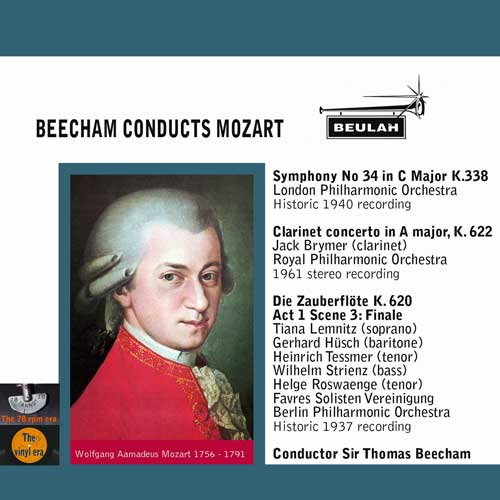 |
Beecham Conducts Mozart
Clarinet Concerto in A Major, K. 622,
Symphony No. 34 in C Major K.338,
Die Zauberflöte K. 620: Act 1, Scene 3 Finale
11:36
|




|
September
This month we publish our
third Charles Avnavour album ( see above). His albums have proved
popular along with Édith Piaf, Django Reinhardt,
Stéphane Grappelli, Joséphine Baker and Charles Trenet.
Clealry French
artists are
popular with our listeners so we will release further album by
French artists.
Keep watch on our
French Arists page.
August
Beulah has a unique
album
of Antony Hopkins Talking About Music. For almost 40 years Antony
Hopkins talks introduced music to many people.
Stephen Johnson
explains
the attraction of Antony Hopkins talks
Our album includes six
talks:-
- Talking About Franck's Symphonic Variations
- Talking About Beethoven's Symphony No. 5
- Talking About Elgar's Enigma Variations
- Talking About Mozart's Symphony No. 41 "Jupiter"
- Talking About Beethoven's Violin Concerto
- Talking About Rachmaninoff's Piano Concerto No. 2
|
12PD50
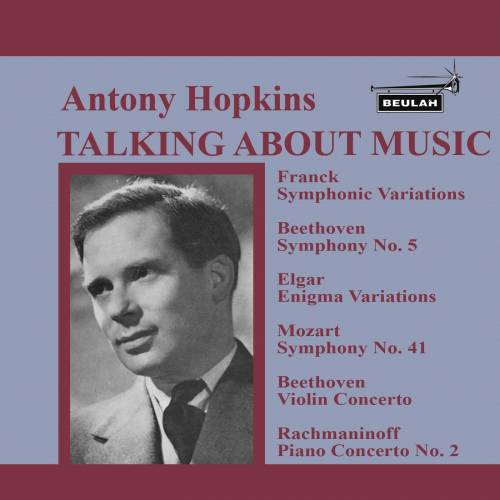 |
Antony Hopkins
Talking About Music
|




|
July
Beulah does have a
representative collection of cinema and theatre organs among its
releases.
Listen to Cinema Organ Favourites
June
Ever popular is Glenn
Miller. We have, across 13 albums, produced over 250 tracks of this
famous band recorded between 1938 and 1944. The albums are all listed
on our Jazz page
Listen to Glenn
Miller
playing "Be Happy"
May
Although the first Beulah
releases did not appear until July 1993, Beualh was created at meeting
held in May 1993 at audio post production house, Chop Em Out in London
W10. Attending the meeting were Bernie Spratt and Simon Heyworth
representing Chop em Out, Malcolm Walker former editor of The
Gramophone, David Michell an avid collector of 78 rpm records and Barry
Coward, proprietor of Film Archive Management and Entertainment (FAME).
The outcome of this
meeting
was that Beulah operated from FAME's base located in Henderson's Film
Laboratory in South Norwood. On 4 July 1993 a devastating fire at the
laboratory resulted in the loss of original negatives of feature films,
notably from Ealing Studios. However Beulah was located on the top
floor
where the damage was from water emitted from fire hoses, so we carried
on
with the planned lauch of Beulah.
In May 1937 the Coronation of
King George VI was held and the Coronation Aldershot Tattoo that
year featured an epligue that paid homage to the new King. In 2020 we
published an album of recordings made on the Rushmore Arena of the
Tattoos from 1932 to 1938. These events featured over 1,000 bandsmen.
|
2PD9
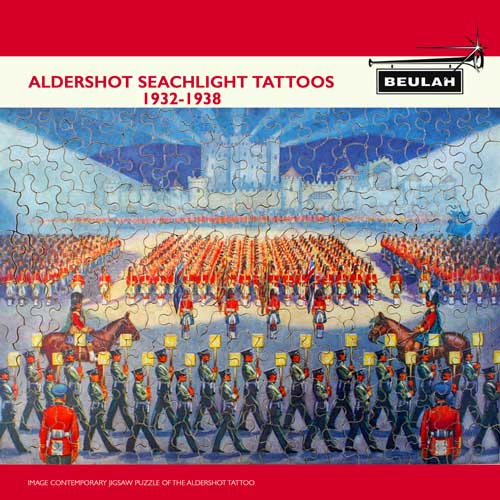 |
Live recordings made at the annual Aldershot
Military Tattoos 1932-8
|



|
April
We feature British Jazz and
Blues
in our series entiteld Jazz
Britannica.
Here
extracts from the
first volume featuring Alexis Corner,
George Mely, Cleo Laine
Go to our Jazz page for all our jazz
albums
March
In time for Alfred Brendel's
90th
birthday we issued three albums of his early recordings. David McDade
reveiwed all three albums. Here is an extract from his review of
Volume 2
"A first glance at the listing on
this second volume of Beulah’s series of the early recordings by Alfred
Brendel would suggest we are in very unfamiliar territory in terms of
the great Austrian pianist’s usual repertoire.
"It turns out that
Mussorgsky’s
collection of curios and grand visions,
based on similarly offbeat paintings by Hartmann, suits Brendel to a
tee. "
"Beulah’s sound throughout
elegantly walks a tightrope between, on the one hand, bright but
brittle and, on the other, resonant but cavernous and booming. In the
Mussorgsky in particular, astonishingly, they find a natural sounding
ambience in which the piano sound sits, which gives proceedings a real
presence. Brendel’s distinctive almost staccato sound is a hard one for
remastering to get right and I think Beulah get it just about spot on."
Read the
full review.
Hear
"The Great Gate of Kiev"
|
2PS86
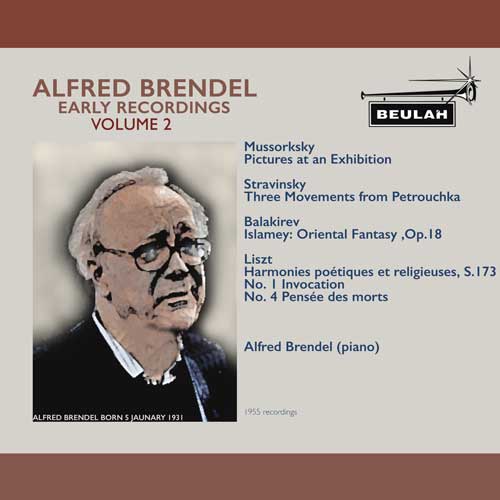 |
Alfred Brendel Early Years 2
Mussorgsky Pictures at an Exhibition
Stravinsky Three Movements from Petroucka
Balakirev Islamey
Liszt Harmonies poetiques et religieuses No 1 and No.4
|





|
February
Decca,
in the LP era, was famed
for its sound. Our album of George Szell conducting Brahms has good
examples of the Decca sound with the Piano Concerto recordred in stereo
in London's Kingsway Hall and the Symphony recorded in mono in the
Concertgebouw, Amsterdam.
Szell
was a perfectionist
and
Curzon was a mercurial pianist. Ken Wilkinson's balance in both
recordings is a revelation. In both venues Wilkinsion had the orchestra
located in the body of the hall rather than on the platform.
Hear
extracts from both
perfomances
|
1PS95
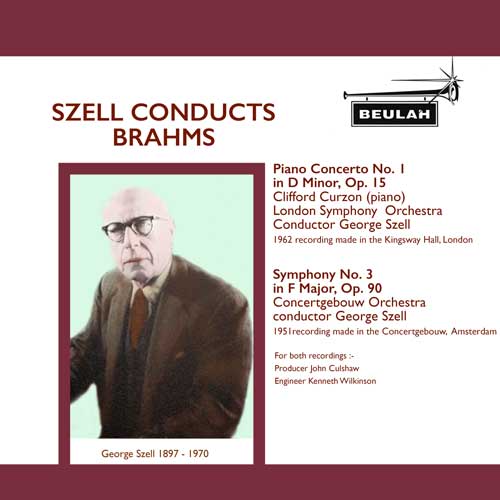 |
Szell Conducts Brahms
Piano Concerto No.1 in D minor Op. 15 with Clifford Curzon
Symphony No.3 in F Major, Op.90
|




|
January
The first Beulah releases
centred
on recordings made in
London's Crystal Palace. The Crystal Palace, located at the top of
Sydenham Hill, had an auditorium that could seat 60,000 people and
accomodtate a choir and orchestra of 3,000.
From 1900 until the building
was destroyed by fire in November 1936 it was the venue for the
National
Brass Band Championships sponsored by railway compaines.
The final event took place just a month before the fatal fire.
Hear
a truncated version
of the
William Tell Oveture from our Brass
at The Crystal Palace album.
|
2PD2
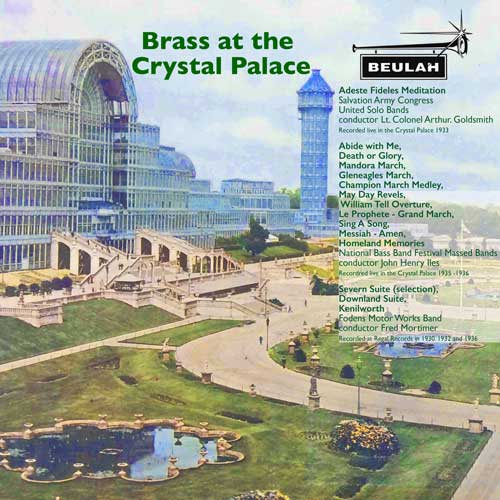 |
Brass at the Crystal Palace Champions
All the brass band tracks recorded in the Crystal Palace originally
relased on 1PD1 and 1PD2.
Adesta Fideles Meditation, Abide With Me, Death
or Glory, Mandora March, Gleneagles March, Champion Medley Nos 1,2 and
3, May Day Revels, William Tell Overture, Sing a Song, Le
prophete Grand March, Messiah Amen, Severn Suite, Downland Suite,
Kenilworth
|





|
|
